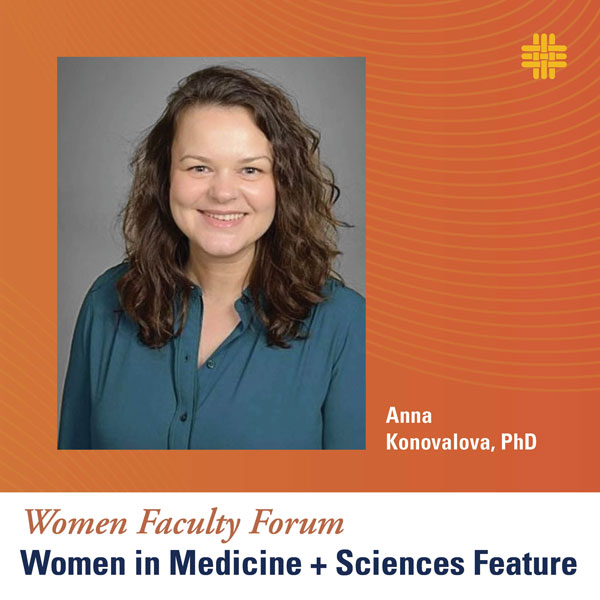Women in Medicine & Sciences Feature: Anna Konovalova, PhD

Each month, the Women Faculty Forum presents its Women in Medicine and Sciences Feature, highlighting the women faculty at McGovern Medical School who are leaders in medicine, research, and education.
This month’s feature is Anna Konovalova, PhD, associate professor in the Department of Microbiology and Molecular Genetics.
What is your background? When did you join UTHealth Houston?
I was born and raised in Ukraine. My journey in science began at the Taras Shevchenko National University of Kyiv, where I earned both my bachelor’s and master’s degrees in microbiology. Driven by my passion for research, I moved to Germany to pursue my PhD at the Max Planck Institute for Terrestrial Microbiology. Afterward, I moved to the United States for my postdoctoral work at Princeton University. I joined UTHealth as a faculty in 2017. I am also a faculty member at the MD Anderson UTHealth Graduate School of Biomedical Sciences (GSBS) and currently co-direct the Microbiology and Infectious Diseases graduate program.
What inspired you to pursue a career in science?
My passion for science has deep roots in my upbringing. With both of my parents being engineers and attending a school focused on STEM education, I had plenty of exposure to the scientific disciplines and even some research growing up. My fascination with bacteria and molecular biology sparked during high school biology classes, which solidified my decision to major in microbiology in college. I’ve been a die-hard microbiologist ever since!
What are the primary research interests that drove your career, and what are you pursuing now?
I am fascinated by bacteria because, despite their seemingly simple structure, they represent the most diverse and successful form of life on Earth. A key factor in this evolutionary success is their ability to sense and adapt rapidly to environmental changes. My primary research focus is on the bacterial cell envelope, which serves as the frontline of this interaction.
I study gram-negative bacteria in particular because these bacteria have a unique two-membrane cell envelope. This barrier prevents many compounds, including most antibiotics, from penetrating, making gram-negative infections extremely challenging to treat and placing them at the top of the CDC and WHO’s urgent threats list for antibiotic resistance. My ultimate research mission is to gain a deeper functional understanding of how bacteria build and maintain their cell envelopes, paving the way for discovery of new antibiotics.
Who are your role models?
I feel incredibly fortunate to have many remarkable and supportive individuals in my life who have influenced me in unique and meaningful ways. My parents are my biggest supporters and, when necessary, my most honest critics. To this day, their wisdom continues to shape me both as a person and as a professional.
My PhD advisor, Dr. Lotte Søgaard-Andersen, is not only an accomplished scientist but also a trailblazer, serving as one of the very few female directors at the Max Planck Society institutions. She encouraged me to embrace project ownership and independence from the very beginning of my journey. Her introductions to many prominent scientists in the field helped me start building my own professional network, and her encouragement was instrumental in my decision to pursue a career in science.
My postdoctoral advisor, Dr. Thomas Silhavy, is a member of the National Academy of Sciences and a renowned bacterial geneticist known for pioneering the use of gene fusions as a research tool. His contributions to various fields, including gram-negative envelope biogenesis, have significantly impacted microbiology as a whole. While I could talk extensively about the invaluable lessons in scientific rigor and integrity that I learned in his lab, what stands out most is his unwavering commitment to his people. Dr. Silhavy genuinely cares about the well-being of both current and former lab members, treating us all like family. He is a remarkable role model for fostering a strong team culture setting a positive tone for how team members interact with one another. I strive to be at least a little bit like him, and I take great pride in being a part of his extraordinary family.
Finally, here at UTHealth, I am surrounded by exceptional faculty colleagues, many of whom are women. They are daily sources of support and inspiration.
What do you enjoy most about working at UTHealth Houston?
There’s so much to love about working here! One of the most rewarding aspects of my job is its multifaceted nature. I lead a research lab, train students and postdoctoral fellows, and contribute meaningfully to our medical school and the GSBS. I particularly enjoy working with trainees who, like our vibrant city of Houston, bring diverse perspectives and enrich my experience both personally and professionally. The supportive and friendly environment in the Department of Microbiology and Molecular Genetics makes it a fantastic place to work.
How do you think UTHealth Houston can further support female faculty?
UTHealth leadership and the Office of Faculty Affairs have built an incredible foundation of resources to support all faculty, including a faculty mentoring program and skills and leadership development workshops. They also provide continuous support for the Women Faculty Forum. I am privileged to serve on the WFF Council, contributing to the mission of the WFF, which includes fostering networking and career development opportunities for women faculty, advocating for their needs, and driving the systemic changes necessary to achieve true gender equality in STEM and medicine. While significant progress has been made, many challenges faced by women faculty remain, particularly those related to mental health, burnout, work-life balance, maternity leave, and childcare issues. I hope our institution will continue to focus on improving these areas to help break down barriers and empower women faculty to thrive in their academic careers.
If you would like to nominate a faculty member for the Women in Medicine and Sciences Feature, click here.